Serving 543 students in grades 9-12, Sheffield High School ranks in the bottom 50% of all schools in Tennessee for overall test scores (math proficiency is bottom 50%, and reading proficiency is bottom 50%).
The percentage of students achieving proficiency in math is 2% (which is lower than the Tennessee state average of 31%). The percentage of students achieving proficiency in reading/language arts is 11% (which is lower than the Tennessee state average of 37%).
The student:teacher ratio of 22:1 is higher than the Tennessee state level of 15:1.
Quick Stats (2025)
- Grades: 9-12
- Enrollment: 543 students
- Student:Teacher Ratio: 22:1
- Graduation Rate: 55-59% (Btm 50% in TN)
- Overall Testing Rank: Bottom 50%
- Math Proficiency: 2% (Btm 50%)
- Reading Proficiency: 11% (Btm 50%)
- Science Proficiency: 6-9% (Btm 50%)
- Source: National Center for Education Statistics (NCES), TN Dept. of Education
Top Rankings
Sheffield High School ranks among the top 20% of public schools in Tennessee for:
Category
Attribute
Percent Eligible For Free Lunch
School Overview
Sheffield High School's student population of 543 students has declined by 18% over five school years.
The teacher population of 25 teachers has declined by 43% over five school years.
Grades Offered
Grades 9-12
Total Students
543 students
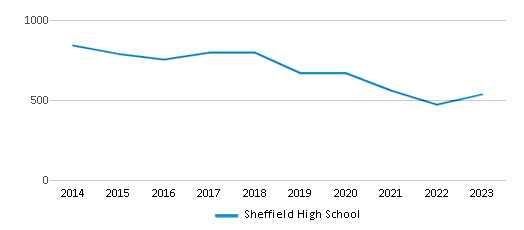
Gender %
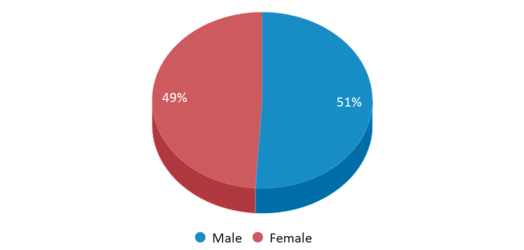
Total Classroom Teachers
25 teachers
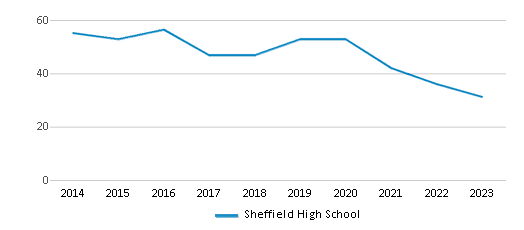
Students by Grade
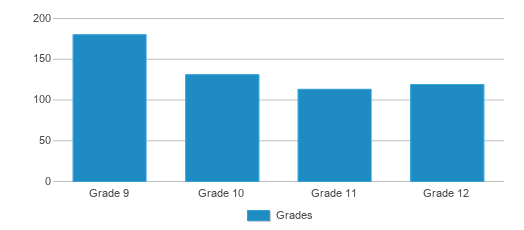
School Rankings
Sheffield High School ranks within the bottom 50% of all 1,761 schools in Tennessee (based off of combined math and reading proficiency testing data).
The diversity score of Sheffield High School is 0.52, which is less than the diversity score at state average of 0.61. The school's diversity has stayed relatively flat over five school years.
Overall Testing Rank
#1718 out of 1761 schools
(Bottom 50%)
(Bottom 50%)
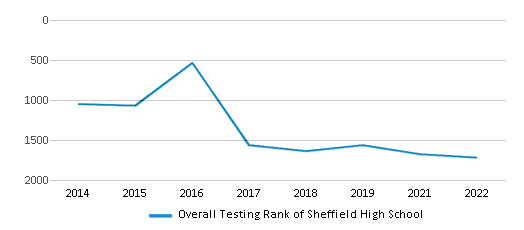
Math Test Scores (% Proficient)
2%
31%
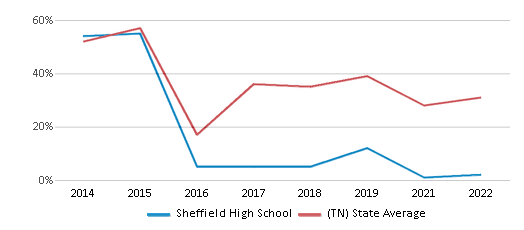
Reading/Language Arts Test Scores (% Proficient)
11%
37%
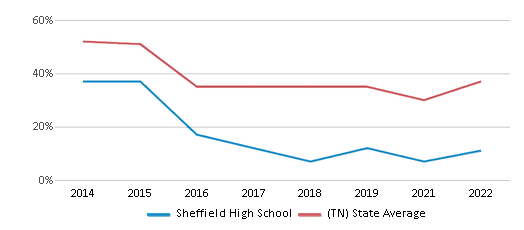
Science Test Scores (% Proficient)
6-9%
40%
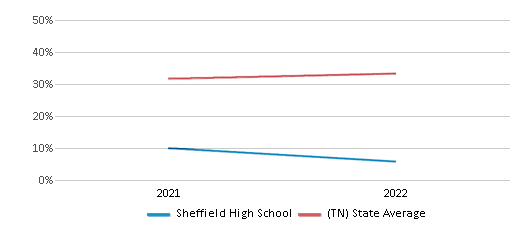
Student : Teacher Ratio
22:1
15:1
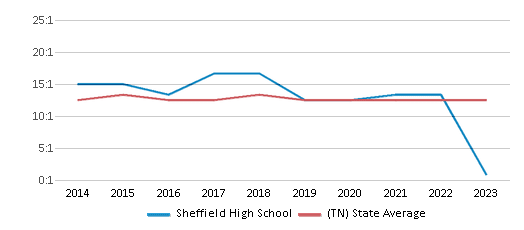
American Indian
n/a
n/a
Asian
n/a
2%
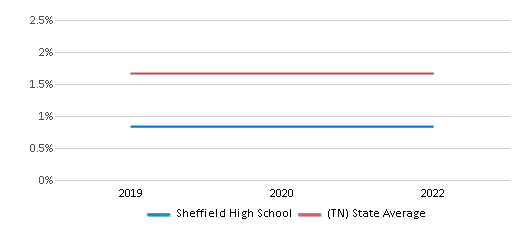
Hispanic
43%
15%
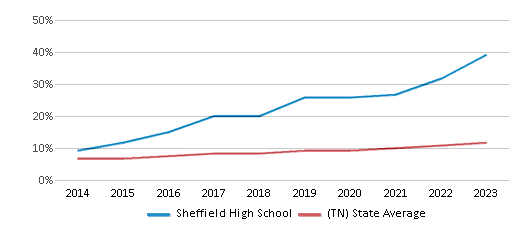
Black
55%
21%
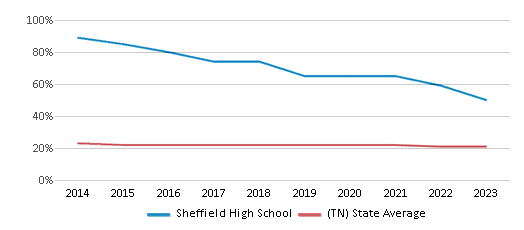
White
n/a
57%
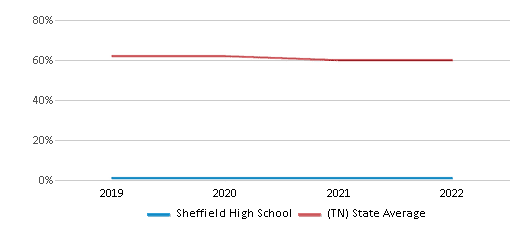
Hawaiian
n/a
n/a
Two or more races
2%
5%
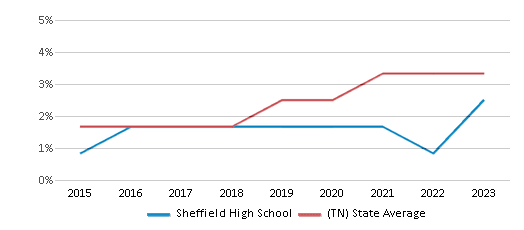
All Ethnic Groups
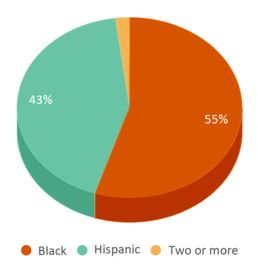
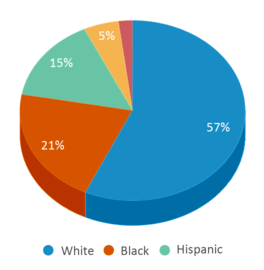
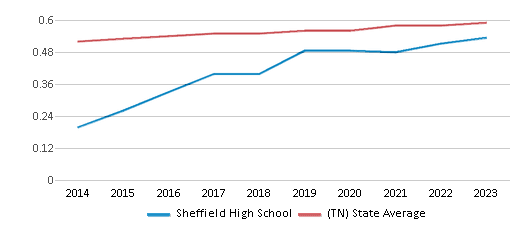
Graduation Rate
55-59%
90%
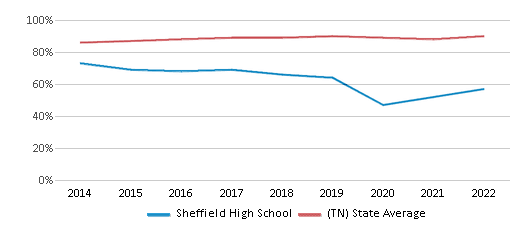
Participates in the National School Lunch Program (NSLP)
Yes
Eligible for Free Lunch
100%
45%
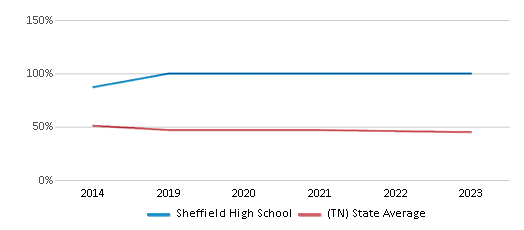
Eligible for Reduced Lunch
6%
6%
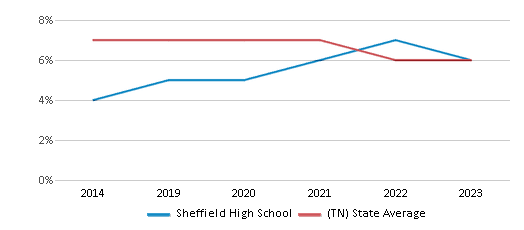
School Statewide Testing
School District Name
Source: National Center for Education Statistics (NCES), TN Dept. of Education
Profile last updated: 02/09/2025
Frequently Asked Questions
What is Sheffield High School's ranking?
Sheffield High School is ranked #1718 out of 1,761 schools, which ranks it among the bottom 50% of public schools in Tennessee.
What percent of students have achieved state testing proficiency in math and reading?
2% of students have achieved math proficiency (compared to the 31% TN state average), while 11% of students have achieved reading proficiency (compared to the 37% TN state average).
What is the graduation rate of Sheffield High School?
The graduation rate of Sheffield High School is 55-59%, which is lower than the Tennessee state average of 90%.
How many students attend Sheffield High School?
543 students attend Sheffield High School.
What is the racial composition of the student body?
55% of Sheffield High School students are Black, 43% of students are Hispanic, and 2% of students are Two or more races.
What is the student:teacher ratio of Sheffield High School?
Sheffield High School has a student ration of 22:1, which is higher than the Tennessee state average of 15:1.
What grades does Sheffield High School offer ?
Sheffield High School offers enrollment in grades 9-12
What school district is Sheffield High School part of?
Sheffield High School is part of Memphis-Shelby County Schools School District.
In what neighborhood is Sheffield High School located?
Sheffield High School is located in the Parkway Village neighborhood of Memphis, TN. There are 10 other public schools located in Parkway Village.
School Reviews
2 4/10/2012
As a parent I have visited Sheffield High School on many occasions and was not happy or satisfied with the students uniform, their appearance and behavior.
I think the teachers are not very concerned about the students. I have asked on different occasions why are anyone enforcing the dress code guidelines and one of the staff members told me that it was a fad and faze that the students are going through and they will change.
I was sadden because if we are teaching our children at home that they are going to be face with many rules and regulations in life that they are should be ready to follow those rules no matter what their personal perferences are; the choices that our students make will make or break them for the rest of their lives. Sheffield High School could be a high performing school if the staff were more concern about the product they are grooming to go out into the world to represent them. Your underdogs (students) are only as strong as the (topdog) make them. They will end up putting out as little as they have received.
Review Sheffield High School. Reviews should be a few sentences in length. Please include any comments on:
- Quality of academic programs, teachers, and facilities
- Availability of music, art, sports and other extracurricular activities
Recent Articles

What Is A Charter School?
Explore the world of charter schools in this comprehensive guide. Learn about their history, how they operate, and the pros and cons of this educational innovation. Discover key facts about charter schools, including admission policies, demographics, and funding, as well as what to look for when considering a charter school for your child.

10 Reasons Why High School Sports Benefit Students
Discover the 10 compelling reasons why high school sports are beneficial for students. This comprehensive article explores how athletics enhance academic performance, foster personal growth, and develop crucial life skills. From improved fitness and time management to leadership development and community representation, learn why participating in high school sports can be a game-changer for students' overall success and well-being.

February 05, 2025
Understanding the U.S. Department of Education: Structure, Impact, and EvolutionWe explore how the Department of Education shapes American education, from its cabinet-level leadership to its impact on millions of students, written for general audiences seeking clarity on this vital institution.





